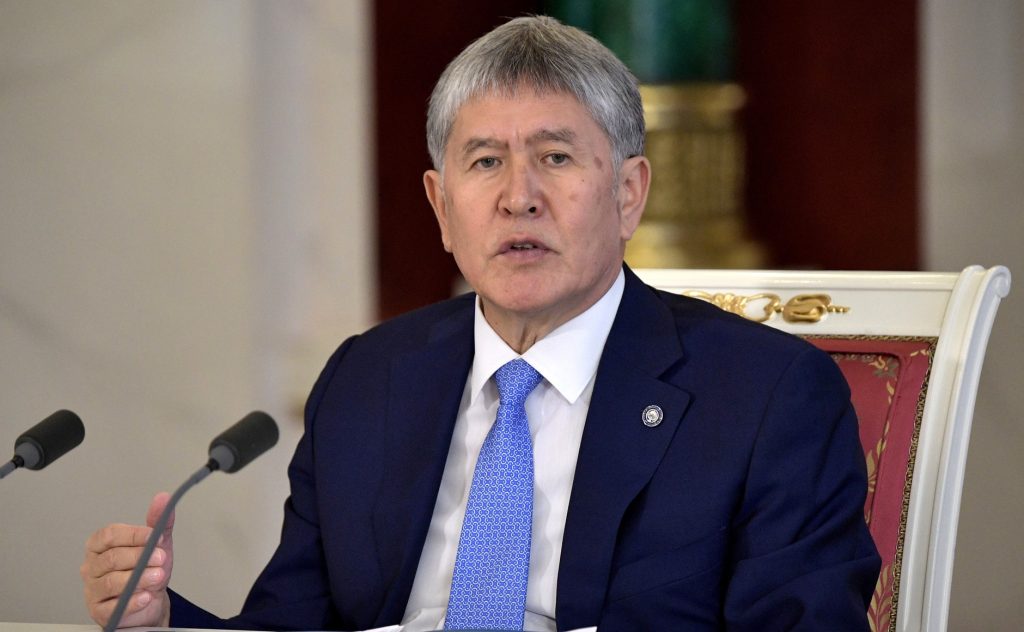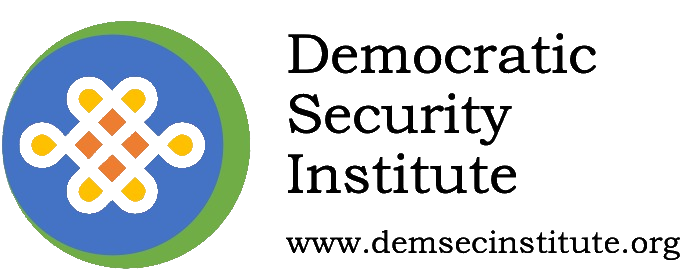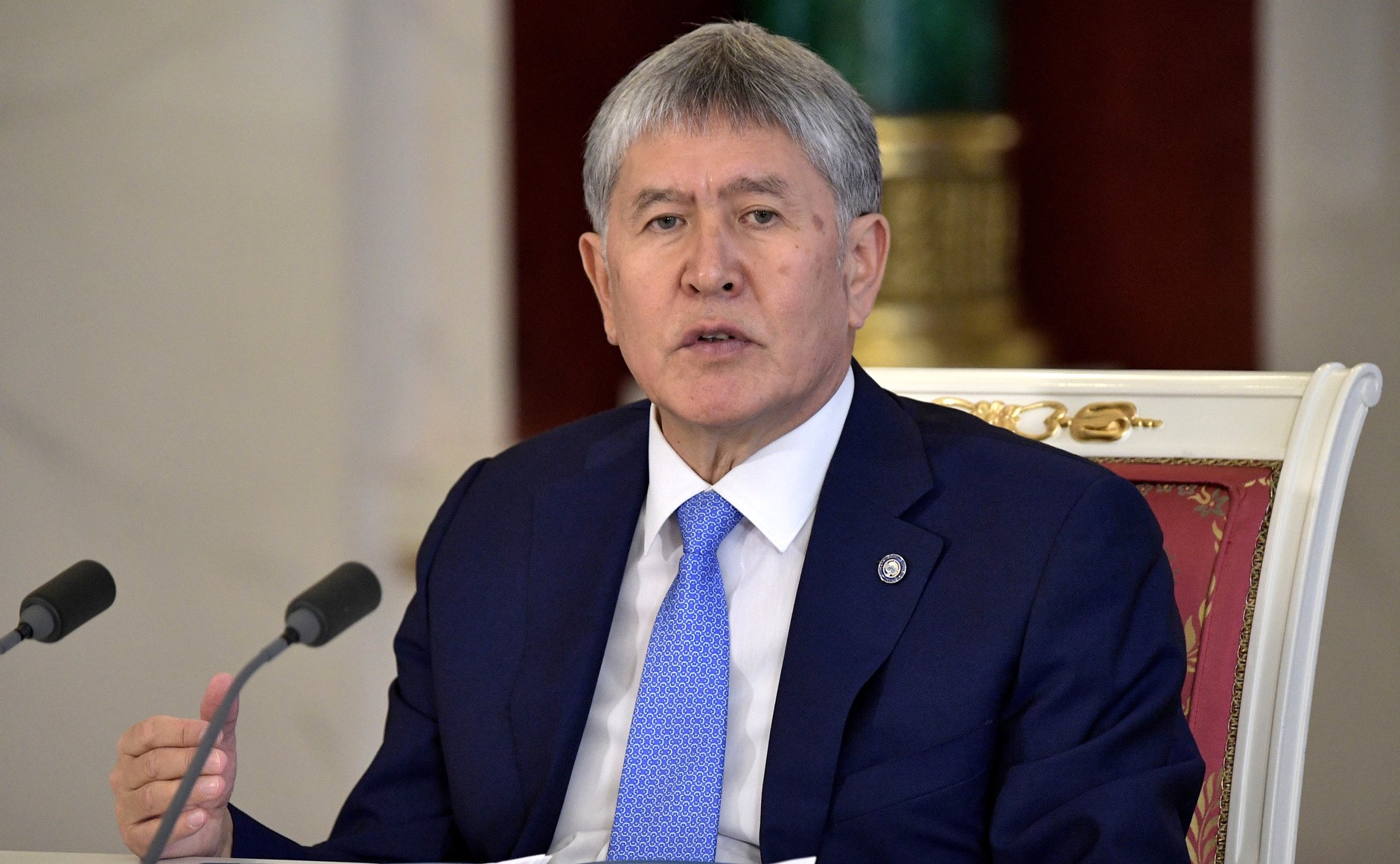Shairbek Juraev
On October 15, Kyrgyzstan is holding presidential elections. These elections are being widely hailed as particularly momentous for Kyrgyzstan (and Central Asia), where incumbent is observing term limits and standing down amid fierce competition from presidential hopefuls. In the days ahead of the vote, however, it remains uncertain whether the Kyrgyz president indeed intends for the elections to be special. While belligerent and active on election-related issues, he has not addressed one hypothetical, but important, question — whether or not he is ready to accept the very real possibility that his hand-picked candidate may be defeated.
Kyrgyz President Almazbek Atambayev’s relinquishment of the presidency has received great attention, but it may be over-hyped. While this development seems novel to observers in neighbouring Central Asian states, Kyrgyzstan has only once since 1991 seen a president openly violate the constitution in favor of an extended tenure — Askar Akaev in 2000. No elections before that or since violated the constitutional term limits, and no president of Kyrgyzstan ever prolonged their own tenure via referendum, as in neighboring countries in mid-1990s.

Former President Roza Otunbaeva did, in fact, step down in 2011 (both Akaev and Kurmanbek Bakiev were ousted while in office). Even though many saw her as a caretaker leader rather than a full-fledged president, Otunbaeva remains a case of a head of the state stepping down and overseeing competitive elections of the next president. Her case is downplayed or ignored partly because the 2011 transition was a smooth one, with Atambaev being the obvious front-runner and freeing Otunbaeva from the potential trouble of crowning an opposition choice. President Atambaev today has a much tougher choice, which will be the true evidence of whether the political system in Kyrgyzstan has sufficiently matured to allow contested elections leading to an incumbent party’s defeat.
Field of Dreams
From a crowded field of some 50 presidential aspirants, 13 — all men except one — reached the stage of registering as candidates. Yet, the electoral campaign has effectively turned into a two-horse race, with presidential pick, former Prime Minister Sooronbai Jeenbekov (who resigned after registering as a candidate), set to square off against against the wealthy businessman-turned- politician, fellow ex-Prime Minister Omurbek Babanov. The choice is not terribly exciting, seen by many in Kyrgyzstan as a competition of “biylik” and “bailyk” — power and wealth. This is a jab at Kyrgyzstan’s perennial issue with perceived abuses of administrative resources, which is seen as being mobilized by Jeenbekov to withstand Babanov’s sheer wealth. The rest of the field include political mid-weights, including another former-Prime Minister Temir Sariev, ex-Speaker Adakhan Madumarov, and the assortment of characters who simply enjoy running for president every 5-6 years. A novelty is also present in the person of Talatbek Masadykov, a former UN security expert . His campaign, mostly focused on international security, seems like a bit of fresh air (perhaps a bit alarmist) in an otherwise ideationally dull electoral season.
“Kyrgyz President Almazbek Atambayev’s relinquishment of the presidency has received great attention, but it may be over-hyped.”
Despite Kyrgyzstan being in the thrall of election fever, regular and reliable opinion polling on the presidential race has been a glaring vacancy. President Atambaev helped fix this recently, announcing results of polling by two companies over past several months. He almost certainly did this to emphasize Jeenbekov’s meteoric rise — from a meager 3 percent in July to 40 percent in October, and the inverse for “opposition” candidate Babanov (20 percent from 40 percent). Babanov, in turn, has cited other polls promising a commanding 60 percent, though some of reported survey companies are hard to locate even with Google, while others produce polls upon request with no information on methodology. At any rate, the picture appears clear without survey data:
Jeenbekov is neck to neck with Babanov. Few expect any candidates to win in the first round, and if one does, the margin is expected to be trivial.
Test the Limits
The coming days, and possibly weeks, will test the maturity and durability of the Kyrgyz political system. President Atambaev has repeatedly claimed how committed he is to oversee competitive, free and fair elections. He has collected much praise for his decision to step down, even though that is simply an act of obeying the law. Yet, perhaps he deserves more praise instead for simply allowing the front-runner opposition candidate to reach election day, as de-registering opposition candidates has long been among the safer electoral tricks in the past. It is also worth noting that the severity of state pressure and politically wielding administrative resources, while evident, seems hardly comparable to much more blatant abuses of power in previous years. Still, the latest political rhetoric reinforces doubts about the ruling party’s readiness to accept anything other than victory.
On 7 October, President Atambaev launched a rhetoric broadside against Babanov, as well as his Kazakh counterpart, Nursultan Nazarbaev. Babanov and President Nazarbaev had met in Astana few weeks earlier, in which the Kazakh President openly backed Babanov in full view of the media. The Kyrgyz foreign ministry protested the meeting as domestic interference, while President Atambaev was even more direct, accusing Nazarbaev of imposing his own preferred candidate on Kyrgyzstan, spearheaded by a badly veiled thrust at Nazarbaev’s long-tenured natural and political life. Repercussions followed immediately, with the Kazakh foreign ministry calling Atambaev’s words provocative and false. The Kazakh Prime Minister, with all the subtlety of a truncheon, saw fit to remind the world that all main transport routes to Kyrgyzstan are via Kazakhstan. As of 11 October, Kazakh border checkpoints were mobilized to “reinforce border control” due to Kyrgyzstan’s elections, condemning hundreds of people and trucks to endless queues. This confrontation will certainly become an oft-cited incident in Central Asian politics in the years to come, but the limits of this crisis have yet to be apparent.
More importantly, Atambaev’s offensive against the Kazakh president came amid mounting state pressure against candidates Babanov and, albeit to a lesser extent, Temir Sariev. President Atambaev accused them of seeking foreign funding, and called on the population to “listen to their own president, and not from the outside.” The president also claimed Babanov, referring to him derogatively as a “mestnyi bai-manapchik” (“local rich man”), should be the first target in an imminent fight against corruption. This is a clear case of threatening the presidential candidate, though few in Kyrgyzstan doubt that Babanov would himself be especially polite or modest with his opponents if in power.
Ultimately, the front-runners in the presidential elections are not all that different. While one is younger than the other, and one is from the south and one from the north (a point overemphasized by many observers), both men long-tenured members of the Kyrgyz political elite, with few genuine achievements to boast about. Their foreign policy views are broadly identical (perhaps until the scandal with the Kazakh president), and their professed views of democracy are as rhetorically alluring as they are hollow.
“Ultimately, the front-runners in the presidential elections are not all that different.”
In reality, Babanov is an “opposition” leader only in the most superficial sense of the word. The main difference between he and Jeenbekov is that the latter was selected as a successor to President Atambaev, and Babanov was not. This distinction without a difference is not terribly unusual, but with the post-election personal safety of losing side at stake, it may turn out to be a consequential one. And today, four days before elections, it remains certainly uncertain whether the Kyrgyz president’s repeated promise for free and fair elections will permit more than one possible outcome. The “successor” candidate winning without leaning on administrative resources, or the “opposition” candidate allowed to achieve victory would serve as good evidence.
Neither appears very likely.
Shairbek Juraev is an EDSN Fellow and a Marie Curie Fellow at the School of International Relations of University of St Andrews. EDSN is an international project of the Center for Social Sciences, Tbilisi, and made possible with generous funding from the National Endowment for Democracy.

